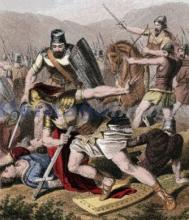Today we come to the end of the first Book of Samuel, chapters 29, 30 and 31. In these chapters, it's easy to see a sort of literary conundrum. As we saw last week, David had allied himself with the Philistines after he fled Israel. When the Philistine king decides to invade Israel with the intent to wholly conquer it, David intends on marching with him. This presents a major problem for storytellers who need David to be a sympathetic figure. How can he take up arms against his own people and still remain the folk hero First Samuel has clearly tried to make him?
As with any cultural epic, the story of David is full of greater meaning, but sometimes it also has to do some narrative leg work. The story of the Philistine/Judah war that claims Saul's life is not bereft of metaphor or moral, but it is more or less a moment of necessary plot development. Two things must happen in these final chapters. First and foremost, Saul must die. Second, David must remain a hero. Since the story has to account for a Philistine conquest that is in other folk stories and because David has promised several times to have no part in the killing of a king anointed by God, David cannot even be present at the final battle.
So, the story sends David on a separate, more noble quest. When the Philistine princes protest his involvement in the war for suspicions of his shifting allegiances, David retires back to the city of Ziklag with his men. When he arrives he discovers that the Amalekites, those go-to bad guys of the Bible, have raided the city and taken many of its people captive. Not to be too flippant, but at the time when the Books of Samuel were written, Amalekites were used in much the same way modern stories use Nazis. They are entirely unsympathetic villains, symbols of evil that are dehumanized to the point of being bogeymen and fodder for heroes. Sending David on a mission to save innocent women and children from Amalekites is a clear indication that the story needs him to remain good and pure, at least for now.
Naturally, David and his soldiers catch up to the Amalekites and reclaim all that they stole from Ziklag. A contingent of David's men numbering around 200 stayed behind at a river because they were too tired, so some of the remaining 400 want David to deny them any spoils of war. David makes a proclamation that essentially says all cultural gains will be distributed evenly from that day forward. Yet again, First Samuel depicts David as the ideal populist hero in contrast to the "might makes right" approach of Saul.
As for Saul, he and his sons suffer a complete defeat at the hands of the Philistines. His sons die in battle at Mt. Gilboa and Saul himself decides to fall on his sword rather than be captured by his enemies. His body and the bodies of his sons are desecrated and the Philistines occupy the cities of Judah. The book ends on a very dark note, but it is obvious that David will soon rise to liberate his people. The reclamation of Ziklag is just a dress rehearsal for a much longer, more difficult battle ahead.
